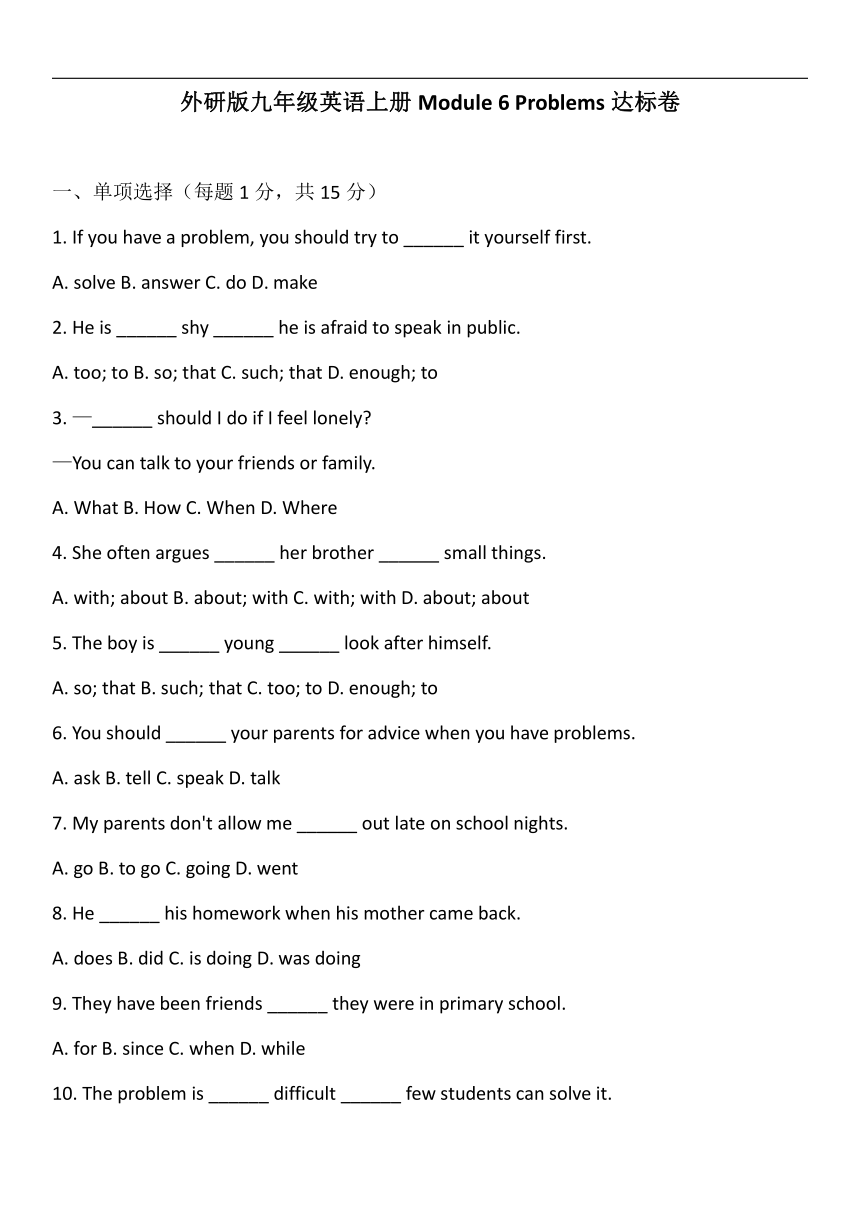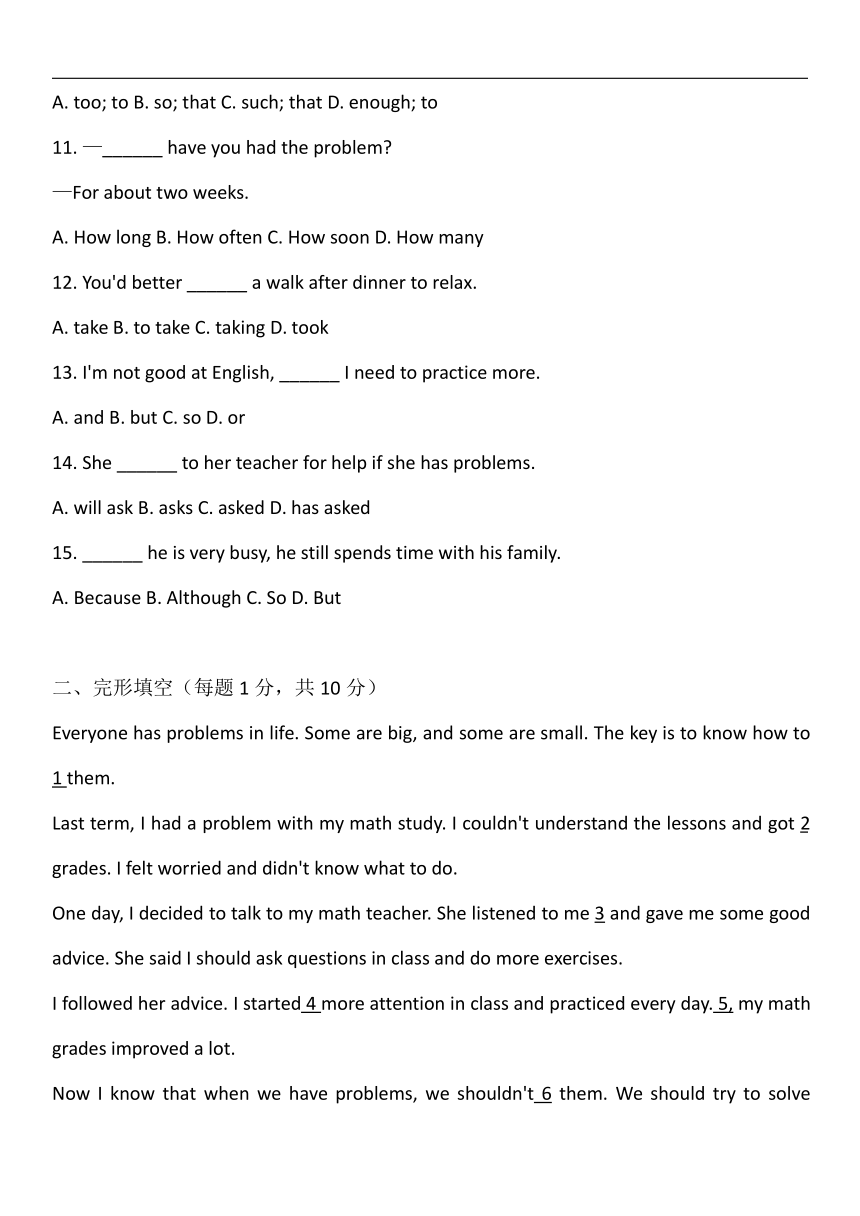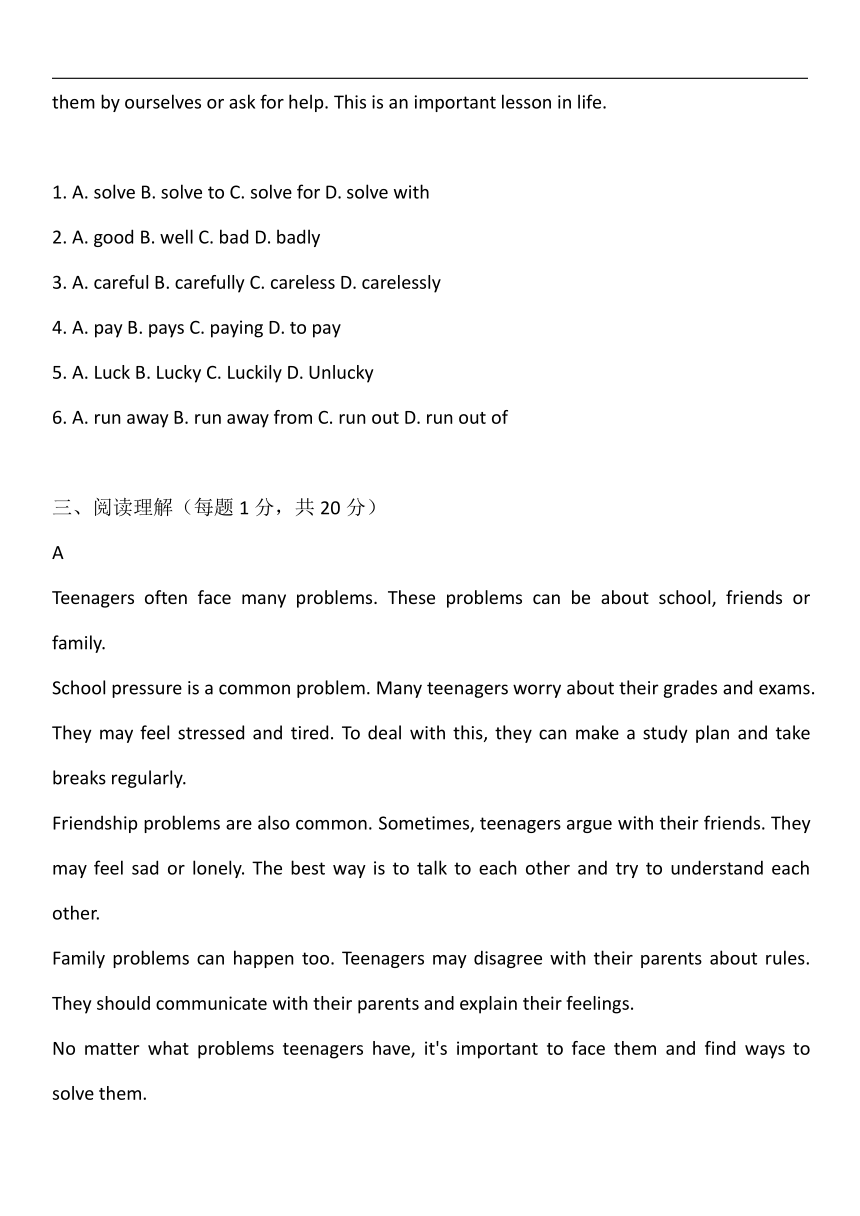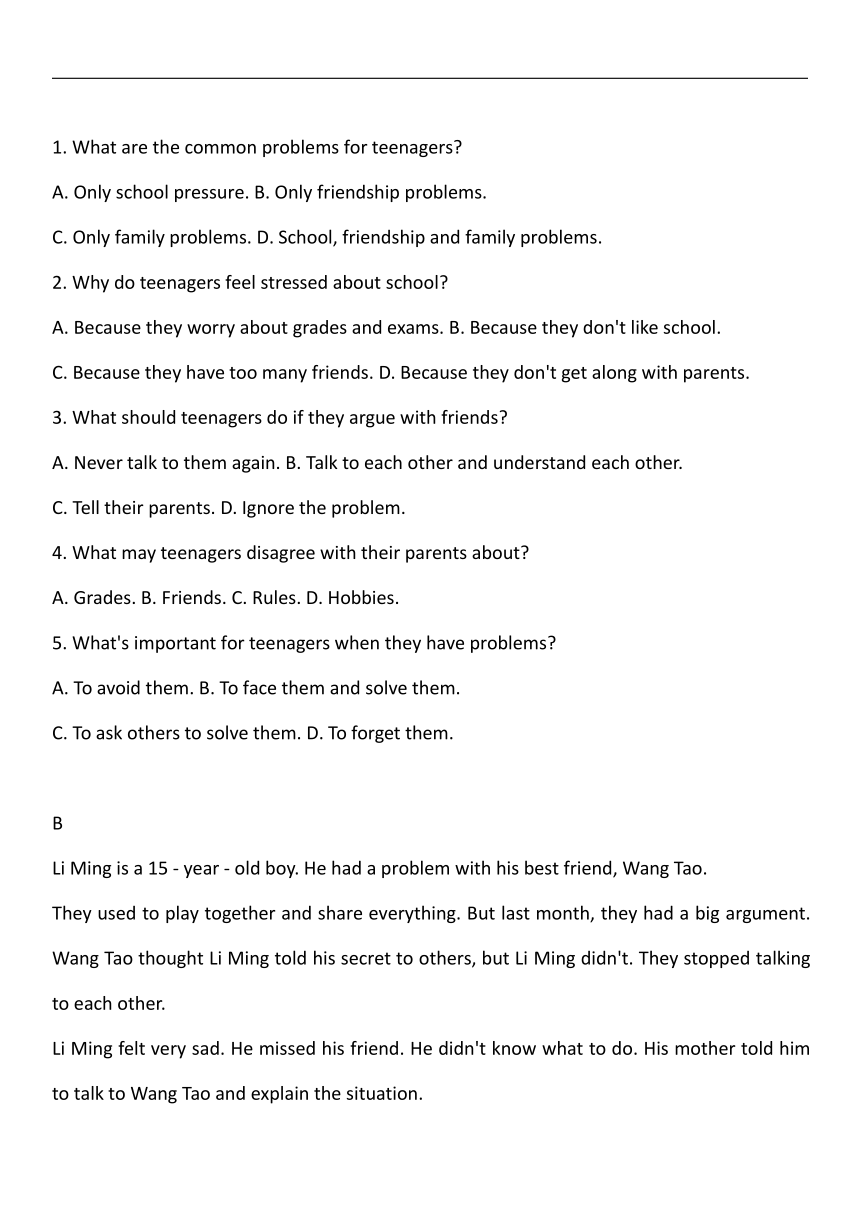Module 6 Problems达标卷(含答案)外研版九年级英语上册
文档属性
| 名称 | Module 6 Problems达标卷(含答案)外研版九年级英语上册 |

|
|
| 格式 | docx | ||
| 文件大小 | 22.5KB | ||
| 资源类型 | 教案 | ||
| 版本资源 | 外研版 | ||
| 科目 | 英语 | ||
| 更新时间 | 2025-07-17 09:37:09 | ||
图片预览




文档简介
外研版九年级英语上册Module 6 Problems达标卷
一、单项选择(每题1分,共15分)
1. If you have a problem, you should try to ______ it yourself first.
A. solve B. answer C. do D. make
2. He is ______ shy ______ he is afraid to speak in public.
A. too; to B. so; that C. such; that D. enough; to
3. —______ should I do if I feel lonely
—You can talk to your friends or family.
A. What B. How C. When D. Where
4. She often argues ______ her brother ______ small things.
A. with; about B. about; with C. with; with D. about; about
5. The boy is ______ young ______ look after himself.
A. so; that B. such; that C. too; to D. enough; to
6. You should ______ your parents for advice when you have problems.
A. ask B. tell C. speak D. talk
7. My parents don't allow me ______ out late on school nights.
A. go B. to go C. going D. went
8. He ______ his homework when his mother came back.
A. does B. did C. is doing D. was doing
9. They have been friends ______ they were in primary school.
A. for B. since C. when D. while
10. The problem is ______ difficult ______ few students can solve it.
A. too; to B. so; that C. such; that D. enough; to
11. —______ have you had the problem
—For about two weeks.
A. How long B. How often C. How soon D. How many
12. You'd better ______ a walk after dinner to relax.
A. take B. to take C. taking D. took
13. I'm not good at English, ______ I need to practice more.
A. and B. but C. so D. or
14. She ______ to her teacher for help if she has problems.
A. will ask B. asks C. asked D. has asked
15. ______ he is very busy, he still spends time with his family.
A. Because B. Although C. So D. But
二、完形填空(每题1分,共10分)
Everyone has problems in life. Some are big, and some are small. The key is to know how to 1 them.
Last term, I had a problem with my math study. I couldn't understand the lessons and got 2 grades. I felt worried and didn't know what to do.
One day, I decided to talk to my math teacher. She listened to me 3 and gave me some good advice. She said I should ask questions in class and do more exercises.
I followed her advice. I started 4 more attention in class and practiced every day. 5, my math grades improved a lot.
Now I know that when we have problems, we shouldn't 6 them. We should try to solve them by ourselves or ask for help. This is an important lesson in life.
1. A. solve B. solve to C. solve for D. solve with
2. A. good B. well C. bad D. badly
3. A. careful B. carefully C. careless D. carelessly
4. A. pay B. pays C. paying D. to pay
5. A. Luck B. Lucky C. Luckily D. Unlucky
6. A. run away B. run away from C. run out D. run out of
三、阅读理解(每题1分,共20分)
A
Teenagers often face many problems. These problems can be about school, friends or family.
School pressure is a common problem. Many teenagers worry about their grades and exams. They may feel stressed and tired. To deal with this, they can make a study plan and take breaks regularly.
Friendship problems are also common. Sometimes, teenagers argue with their friends. They may feel sad or lonely. The best way is to talk to each other and try to understand each other.
Family problems can happen too. Teenagers may disagree with their parents about rules. They should communicate with their parents and explain their feelings.
No matter what problems teenagers have, it's important to face them and find ways to solve them.
1. What are the common problems for teenagers
A. Only school pressure. B. Only friendship problems.
C. Only family problems. D. School, friendship and family problems.
2. Why do teenagers feel stressed about school
A. Because they worry about grades and exams. B. Because they don't like school.
C. Because they have too many friends. D. Because they don't get along with parents.
3. What should teenagers do if they argue with friends
A. Never talk to them again. B. Talk to each other and understand each other.
C. Tell their parents. D. Ignore the problem.
4. What may teenagers disagree with their parents about
A. Grades. B. Friends. C. Rules. D. Hobbies.
5. What's important for teenagers when they have problems
A. To avoid them. B. To face them and solve them.
C. To ask others to solve them. D. To forget them.
B
Li Ming is a 15 - year - old boy. He had a problem with his best friend, Wang Tao.
They used to play together and share everything. But last month, they had a big argument. Wang Tao thought Li Ming told his secret to others, but Li Ming didn't. They stopped talking to each other.
Li Ming felt very sad. He missed his friend. He didn't know what to do. His mother told him to talk to Wang Tao and explain the situation.
Li Ming took his mother's advice. He found Wang Tao and had a honest talk. Wang Tao realized he was wrong. They became good friends again.
Li Ming learned that communication is the best way to solve friendship problems.
1. How old is Li Ming
A. 13. B. 14. C. 15. D. 16.
2. Who is Li Ming's best friend
A. Wang Tao. B. Li Hua. C. Zhang Wei. D. Liu Yang.
3. Why did they have a big argument
A. Because Li Ming didn't help Wang Tao. B. Because Wang Tao thought Li Ming told his secret.
C. Because they wanted different toys. D. Because they had different opinions on study.
4. What did Li Ming's mother advise him to do
A. To forget Wang Tao. B. To talk to Wang Tao and explain.
C. To make a new friend. D. To tell the teacher.
5. What did Li Ming learn
A. Friends are not important. B. Communication solves friendship problems.
C. Never argue with friends. D. Secrets should be kept.
四、词汇运用(每题1分,共15分)
A) 根据句意及首字母提示填空
1. Don't w______ about the problem too much. We can solve it together.
2. You should c______ with your parents when you have difficulties.
3. He often a______ with his sister about watching TV.
4. The problem is d______, but we'll try our best to solve it.
5. It's important to ask for a______ when you don't know what to do.
B) 用所给单词的适当形式填空
6. They ______ (argue) about the problem when I came in.
7. You should ______ (talk) to your teacher if you have study problems.
8. It's difficult ______ (solve) this problem in a short time.
9. My parents ______ (not allow) me to play computer games for long.
10. She ______ (have) the problem since last week.
C) 选词并用其适当形式填空
solve, feel, talk, ask, argue
11. He ______ better after sharing his problems with his friend.
12. They decided ______ the problem by themselves.
13. You should ______ your parents for help when you are in trouble.
14. She often ______ with her brother, but they make up soon.
15. We ______ about our study plans yesterday afternoon.
五、句型转换(每题2分,共10分)
1. She is too young to go to school.(改为同义句)
She is ______ young ______ she can't go to school.
2. You should talk to your parents.(改为否定句)
You ______ ______ to your parents.
3. He has had the problem for two weeks.(对划线部分提问)
______ ______ ______ he had the problem
4. If I feel lonely, I will talk to my friends.(对划线部分提问)
______ ______ you ______ if you feel lonely
5. They often argue about small things.(改为一般疑问句)
______ they often ______ about small things
六、书面表达(20分)
在生活中,你一定遇到过一些问题(如学习压力、与朋友争吵等)。请以“My Problem and Solution”为题,描述你遇到的一个问题,以及你是如何解决它的。词数不少于80字。
______________________________________________________________________________________________________________________________________________________________________________________________________________________________________________________________________________________________________________________________________________________________________________________________________________________________________________________________________________________________________________________________________________________________________________________________________________________________________________________________________________________________________________________________________________________________________________
答案
一、1-5 ABACC 6-10 ABDBB 11-15 AACAB
二、1-5 ACBCC 6 B
三、A:1-5 DABCB B:1-5 CABBB
四、A) 1.worry 2.communicate 3.argues 4.difficult 5.advice
B) 6.were arguing 7.talk 8.to solve 9.don't allow 10.has had
C) 11.felt 12.to solve 13.ask 14.argues 15.talked
五、1.so; that 2.shouldn't talk 3.How long has 4.What will; do 5.Do; argue
一、单项选择(每题1分,共15分)
1. If you have a problem, you should try to ______ it yourself first.
A. solve B. answer C. do D. make
2. He is ______ shy ______ he is afraid to speak in public.
A. too; to B. so; that C. such; that D. enough; to
3. —______ should I do if I feel lonely
—You can talk to your friends or family.
A. What B. How C. When D. Where
4. She often argues ______ her brother ______ small things.
A. with; about B. about; with C. with; with D. about; about
5. The boy is ______ young ______ look after himself.
A. so; that B. such; that C. too; to D. enough; to
6. You should ______ your parents for advice when you have problems.
A. ask B. tell C. speak D. talk
7. My parents don't allow me ______ out late on school nights.
A. go B. to go C. going D. went
8. He ______ his homework when his mother came back.
A. does B. did C. is doing D. was doing
9. They have been friends ______ they were in primary school.
A. for B. since C. when D. while
10. The problem is ______ difficult ______ few students can solve it.
A. too; to B. so; that C. such; that D. enough; to
11. —______ have you had the problem
—For about two weeks.
A. How long B. How often C. How soon D. How many
12. You'd better ______ a walk after dinner to relax.
A. take B. to take C. taking D. took
13. I'm not good at English, ______ I need to practice more.
A. and B. but C. so D. or
14. She ______ to her teacher for help if she has problems.
A. will ask B. asks C. asked D. has asked
15. ______ he is very busy, he still spends time with his family.
A. Because B. Although C. So D. But
二、完形填空(每题1分,共10分)
Everyone has problems in life. Some are big, and some are small. The key is to know how to 1 them.
Last term, I had a problem with my math study. I couldn't understand the lessons and got 2 grades. I felt worried and didn't know what to do.
One day, I decided to talk to my math teacher. She listened to me 3 and gave me some good advice. She said I should ask questions in class and do more exercises.
I followed her advice. I started 4 more attention in class and practiced every day. 5, my math grades improved a lot.
Now I know that when we have problems, we shouldn't 6 them. We should try to solve them by ourselves or ask for help. This is an important lesson in life.
1. A. solve B. solve to C. solve for D. solve with
2. A. good B. well C. bad D. badly
3. A. careful B. carefully C. careless D. carelessly
4. A. pay B. pays C. paying D. to pay
5. A. Luck B. Lucky C. Luckily D. Unlucky
6. A. run away B. run away from C. run out D. run out of
三、阅读理解(每题1分,共20分)
A
Teenagers often face many problems. These problems can be about school, friends or family.
School pressure is a common problem. Many teenagers worry about their grades and exams. They may feel stressed and tired. To deal with this, they can make a study plan and take breaks regularly.
Friendship problems are also common. Sometimes, teenagers argue with their friends. They may feel sad or lonely. The best way is to talk to each other and try to understand each other.
Family problems can happen too. Teenagers may disagree with their parents about rules. They should communicate with their parents and explain their feelings.
No matter what problems teenagers have, it's important to face them and find ways to solve them.
1. What are the common problems for teenagers
A. Only school pressure. B. Only friendship problems.
C. Only family problems. D. School, friendship and family problems.
2. Why do teenagers feel stressed about school
A. Because they worry about grades and exams. B. Because they don't like school.
C. Because they have too many friends. D. Because they don't get along with parents.
3. What should teenagers do if they argue with friends
A. Never talk to them again. B. Talk to each other and understand each other.
C. Tell their parents. D. Ignore the problem.
4. What may teenagers disagree with their parents about
A. Grades. B. Friends. C. Rules. D. Hobbies.
5. What's important for teenagers when they have problems
A. To avoid them. B. To face them and solve them.
C. To ask others to solve them. D. To forget them.
B
Li Ming is a 15 - year - old boy. He had a problem with his best friend, Wang Tao.
They used to play together and share everything. But last month, they had a big argument. Wang Tao thought Li Ming told his secret to others, but Li Ming didn't. They stopped talking to each other.
Li Ming felt very sad. He missed his friend. He didn't know what to do. His mother told him to talk to Wang Tao and explain the situation.
Li Ming took his mother's advice. He found Wang Tao and had a honest talk. Wang Tao realized he was wrong. They became good friends again.
Li Ming learned that communication is the best way to solve friendship problems.
1. How old is Li Ming
A. 13. B. 14. C. 15. D. 16.
2. Who is Li Ming's best friend
A. Wang Tao. B. Li Hua. C. Zhang Wei. D. Liu Yang.
3. Why did they have a big argument
A. Because Li Ming didn't help Wang Tao. B. Because Wang Tao thought Li Ming told his secret.
C. Because they wanted different toys. D. Because they had different opinions on study.
4. What did Li Ming's mother advise him to do
A. To forget Wang Tao. B. To talk to Wang Tao and explain.
C. To make a new friend. D. To tell the teacher.
5. What did Li Ming learn
A. Friends are not important. B. Communication solves friendship problems.
C. Never argue with friends. D. Secrets should be kept.
四、词汇运用(每题1分,共15分)
A) 根据句意及首字母提示填空
1. Don't w______ about the problem too much. We can solve it together.
2. You should c______ with your parents when you have difficulties.
3. He often a______ with his sister about watching TV.
4. The problem is d______, but we'll try our best to solve it.
5. It's important to ask for a______ when you don't know what to do.
B) 用所给单词的适当形式填空
6. They ______ (argue) about the problem when I came in.
7. You should ______ (talk) to your teacher if you have study problems.
8. It's difficult ______ (solve) this problem in a short time.
9. My parents ______ (not allow) me to play computer games for long.
10. She ______ (have) the problem since last week.
C) 选词并用其适当形式填空
solve, feel, talk, ask, argue
11. He ______ better after sharing his problems with his friend.
12. They decided ______ the problem by themselves.
13. You should ______ your parents for help when you are in trouble.
14. She often ______ with her brother, but they make up soon.
15. We ______ about our study plans yesterday afternoon.
五、句型转换(每题2分,共10分)
1. She is too young to go to school.(改为同义句)
She is ______ young ______ she can't go to school.
2. You should talk to your parents.(改为否定句)
You ______ ______ to your parents.
3. He has had the problem for two weeks.(对划线部分提问)
______ ______ ______ he had the problem
4. If I feel lonely, I will talk to my friends.(对划线部分提问)
______ ______ you ______ if you feel lonely
5. They often argue about small things.(改为一般疑问句)
______ they often ______ about small things
六、书面表达(20分)
在生活中,你一定遇到过一些问题(如学习压力、与朋友争吵等)。请以“My Problem and Solution”为题,描述你遇到的一个问题,以及你是如何解决它的。词数不少于80字。
______________________________________________________________________________________________________________________________________________________________________________________________________________________________________________________________________________________________________________________________________________________________________________________________________________________________________________________________________________________________________________________________________________________________________________________________________________________________________________________________________________________________________________________________________________________________________________
答案
一、1-5 ABACC 6-10 ABDBB 11-15 AACAB
二、1-5 ACBCC 6 B
三、A:1-5 DABCB B:1-5 CABBB
四、A) 1.worry 2.communicate 3.argues 4.difficult 5.advice
B) 6.were arguing 7.talk 8.to solve 9.don't allow 10.has had
C) 11.felt 12.to solve 13.ask 14.argues 15.talked
五、1.so; that 2.shouldn't talk 3.How long has 4.What will; do 5.Do; argue
同课章节目录
- Module 1 Wonders of the world
- Unit 1 It's more than 2,000 years old.
- Unit 2 The Grand Canyon was not just big.
- Unit 3 Language in use
- Module 2 Public holidays
- Unit 1 My family always go somewhere interesting a
- Unit 2 We have celebrated the festival since the f
- Unit 3 Language in use
- Module 3 Heroes
- Unit 1 She trained hard,so she became a great play
- Unit 2There were few doctors, so he had to work ve
- Unit 3 Language in use
- Module 4 Home alone
- Unit 1 I can look after myself, although it won’t
- Unit 2 I became so bored with their orders that I
- Unit 3 Language in use
- Module 5 Museums
- Unit 1 Don't cross that rope!
- Unit 2 If you ever go to London, make sure you vis
- Unit 3 Language in use
- Module 6 Problems
- Unit 1 If I start after dinner, I'll finish it be
- Unit 2 If you tell him the truth now, you will sho
- Unit 3 Language in use
- Revision Module A
- Module 7 Great books
- Unit 1 We're still influenced by Confucius's idea
- Unit 2 It is still read and loved.
- Unit 3 Language in use
- Module 8 Sports life
- Unit 1 Daming wasn't chosen for the team last time
- Unit 2 He was invited to competitions around the w
- Unit 3 Language in use
- Module 9 Great inventions
- Unit 1 Will computers be used more than books in t
- Unit 2 Will books be replaced by the Internet?
- Unit 3 Language in use
- Module 10 Australia
- Unit 1 I have some photos that I took in Australia
- Unit 2 The game that they like most is Australian
- Unit 3 Language in use
- Module 11 Photos
- Unit 1 He's the boy who won the photo competition
- Unit 2 The photo which we liked best was taken by
- Unit 3 Language in use
- Module 12 Save our world
- Unit 1 If everyone starts to do something, the wor
- Unit 2 Repeat these three words daily: reduce, reu
- Unit 3 Language in use
- Revision Module B
